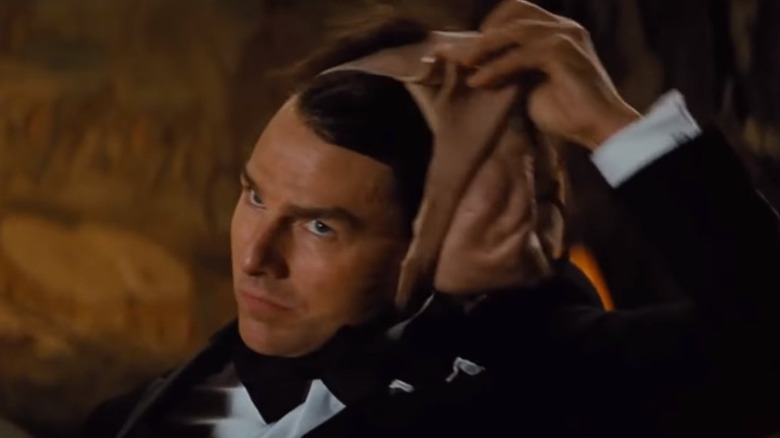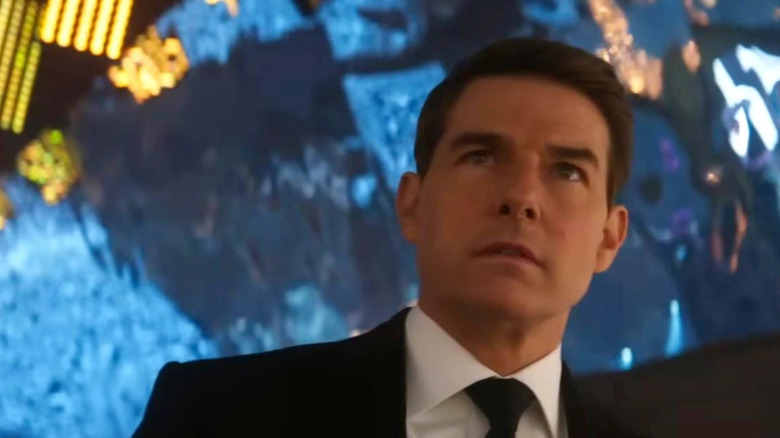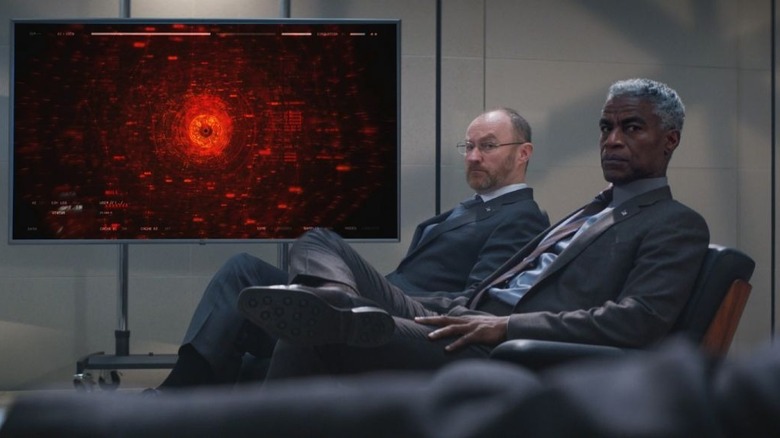Mission: Impossible Used To Be A Movie Series About Acting – Now It's A Series About Directing
The opening scene of "Mission: Impossible" is a ruse. The scene begins with an on-screen title stating that we're in "Kiev" before revealing a man, Jack, watching two other men on a closed-circuit monitor while a dead woman lies on a bed behind them. After one of the two men says something that Jack (Emilio Estevez) looks up on his laptop, the ruse is revealed to the audience: one of the men in that room is actually IMF agent Ethan Hunt (Tom Cruise), wearing a special mask in order to extract necessary info from his mark, and Jack, as well as the woman, Claire (Emmanuelle Béart), are part of his now-successful team.
That's how the long-running "Mission: Impossible" film franchise begins, and the scene not only perfectly sets up the tone of both the movie and the franchise to come, but also contains a good deal of director Brian De Palma's signature touches. To wit: while there is a voyeuristic edge to the scene, it's also a piece of theatre hidden inside a major motion picture. Within the scene itself are not only "actors" but an "audience member" in the form of Jack.
From there, the "Mission: Impossible" series has continued to examine the myriad ways spycraft and acting are two highly similar skill sets. Until, that is, the release of the latest installment, "Dead Reckoning Part One," in which these tenets of the series are flipped on the audience and the characters. The movie's ultimate antagonist, a manipulative rogue AI known as "The Entity," effectively usurps power from the IMF's troupe of "actors," turning the film and the series into an allegory for directing.
The actor and the spy
It's hardly a surprise that "Mission: Impossible" delved so deeply and consistently into the parallels between a spy's life and the craft of acting. After all, the two vocations have always been connected: the recent book "Stars and Spies: Intelligence Operations and the Entertainment Business," written by intelligence historian Christopher Andrew and theatre director Julius Green, delves into the history of ways in which the two worlds intersect, pointing out that "The adoption of a fictional persona, the learning of scripts and the ability to improvise" are all elements of both the spy's and actor's toolkit.
De Palma's "Mission: Impossible" explored the paranoia inherent within the movie's central premise in a number of ways, and that theme of deception and mistrust continued throughout the subsequent sequels. With "Mission: Impossible 2," director John Woo established a yin/yang relationship between Hunt and rogue IMF agent Sean Ambrose (Dougray Scott), the two romancing the same woman, exchanging personas, and demonstrating how each could "play" the other man successfully in a highly similar fashion to Woo's "Face/Off." J.J. Abrams' "Mission: Impossible III" piles on the layers of performance: Ethan attempts to portray an entirely different version of himself for his unsuspecting civilian wife, Julia (Michelle Monaghan) during a film that contains a scene in which Philip Seymour Hoffman's sociopath Owen Davian is impersonated by Hunt, meaning Hoffman is playing Ethan playing Davian.
Each successive sequel kept exploring these themes: Brad Bird's "Ghost Protocol" sees Hunt instruct Jane Carter (Paula Patton) how to put on a performance in real-time, Christopher McQuarrie's "Rogue Nation" features Hunt meeting the double agent Ilsa Faust (Rebecca Ferguson) at a literal performance of the opera "Turandot," and "Fallout" features not one but two scenes that recall the opening of the first "Mission," in which a ruse is staged for the characters' mark as well as the audience.
The puppet master
One of the great traits of the "M:I" franchise is how each film has its own unique tone, and "Dead Reckoning" accomplishes this neatly by introducing the threat of The Entity. Where prior "Mission" films have involved a fanatical terrorist or rogue agent (solo or part of a group) threatening the fate of the free world from the shadows, "Dead Reckoning" sees the Intelligence Community and Ethan Hunt simultaneously learning of the existence of an algorithm gone rogue. The Entity AI has access to every bit of data in the entire world and thus has the ability to manipulate the real world at will: it can not only remove information, but falsify it, change it, and weaponize it.
The Entity has also made a study of every major player in the Community (in addition to every other living person in the world, it's implied), meaning that it's numerous steps ahead of everyone's actions before they ever make any. Using this information, The Entity is essentially moving humans around the chessboard of the planet to further its own ends, and in Ethan's case, ensure its own existence lest Hunt reach its source code and shut it down forever.
While the sci-fi aspect and social commentary of The Entity are fairly on-the-surface, thematically the unseen (but not necessarily unheard) villain takes over the "Mission" world as a capital-D Director. In the way the prior "Mission" films can be seen as an allegory for acting, the addition of The Entity introduces a concept to the movie not unlike the idea of "Regietheater" in the stage and opera world: the presence of a Director who exerts total control over the narrative and those within it.
From no control to too much control
Ever since the introduction of clandestine government intelligence agencies around the beginning of the 20th century, popular media have explored the various obvious potential worries and pitfalls facing such agencies and the people who work for them. Alfred Hitchcock explored "wrong man" paranoia in 1935's "The 39 Steps," and from that point, the majority of spy fiction tends to revolve around themes of obfuscation, resulting in films bemused by espionage's foolish complexity (as in the Coen Brothers' "Burn After Reading") and utilizing that complexity to introduce even more complexity (as in Christopher Nolan's "Tenet").
Often alongside that constant theme in spy films is a worrying notion that the puppet master (or chess master, if you will) behind events in the intelligence world may be a complete unknown: witness the unsolved mystery behind the events of John Frankenheimer's "The Manchurian Candidate" as well as the casual ambiguity of Sidney J. Furie's "The Ipcress File." These films and many others like them examine the fear behind the potential existence of one or many shadow governments, culminating in the pre-millennial freakout of "The X-Files" and even, as its title implies, "Rogue Nation."
"Dead Reckoning" cleverly acknowledges the fact that a good couple of decades into the 21st century, hardly anything is as private as it used to be. Thus, Solomon Lane (Sean Harris) and his cohorts rabid for government destabilization are nowhere to be seen in the film, as The Entity has accomplished in one fell swoop what Lane and his anarchic companions couldn't. It presents a threat of too much control, going beyond mere fascistic dictatorship to one where every person's free will must be sublimated to The Entity — a demand that's been attributed to many a tyrannical film director.
An allegory for artists vs. studios
Lest one thinks that McQuarrie is subtly insulting his own position and profession, however, The Entity-as-Director represents another element entirely when taken into context of the entire "Mission" series. For one thing, it may be McQuarrie's own neurosis personified: famously, the "Mission" films were director-driven until McQuarrie effectively took over the series with "Rogue Nation." Perhaps he's poking some cheeky fun at himself with The Entity, a master Director who poses a threat to Ethan — and by extension, Cruise — getting away with whatever he wishes, on-screen and off.
Yet there's another way to see The Entity as a response to De Palma's bold, subversive choices in the first "Mission." In that film, the character of Jim Phelps (played by Jon Voight) — the only character from the original CBS series to feature in the film adaptation — is Ethan's mentor and the team leader; in essence, its director. When De Palma has Ethan betrayed by his father figure/director, it not only signals the "Mission" films' divorce from the TV series that spawned it, it also frees up Ethan and his teammates to become their own bosses. Sure, subsequent "M:I" films have Ethan and company given missions from a revolving door of superiors, but, as many characters have pointed out over the last couple entries, Ethan always goes rogue.
Perhaps McQuarrie sees Ethan and his IMF team as independent artists, getting the "funding" and "greenlight" from gruff people in suits and then going off and doing their own thing. The Entity, then, could be seen as the revenge of a corporate-minded studio, a controlling force that is trying to make Ethan and the rest follow its mandate no matter what (one that even includes the demise of beloved characters). Although "Dead Reckoning" went into production before the scourge of AI really started to threaten creative people working in Hollywood, it's difficult not to see the parallels. Let's hope that film-history-loving filmmakers like McQuarrie and surviving, honest-to-gosh movie stars like Cruise can pull off their own impossible mission and shut that AI threat down for good.




